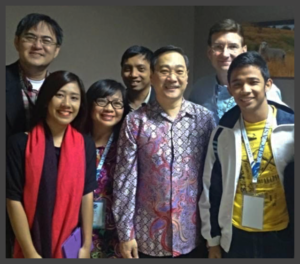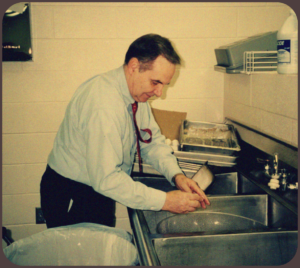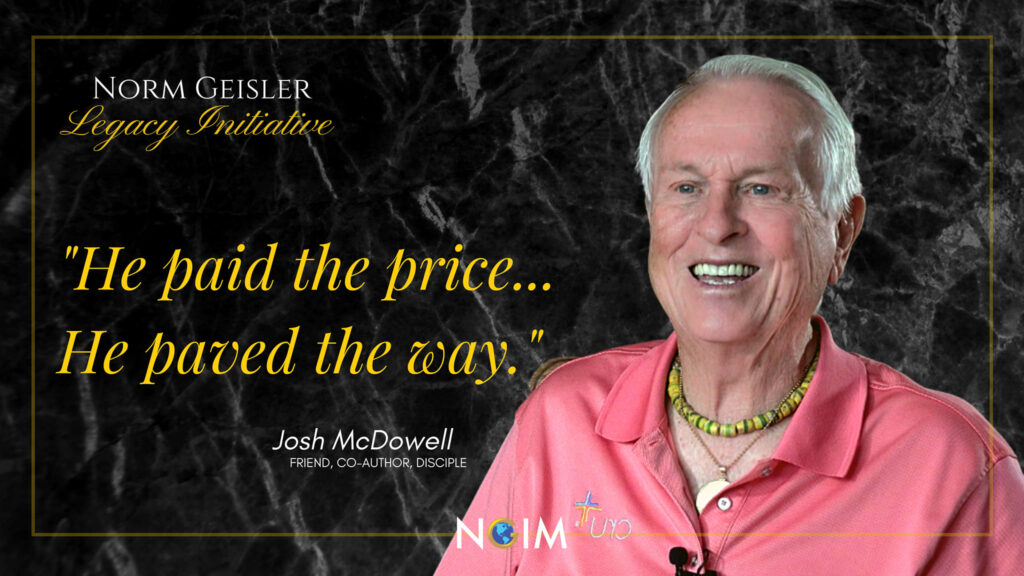By David Geisler
Our ministry has been directed to change its DNA… in light of what God has been calling us to be!
I have learned that my father, Norm Geisler, had such a great impact on Christianity not only because of what he taught, but also because of how he lived.
He saw himself as a servant of Christ first and foremost. As a result, he was always reaching out and trying to help others. I can’t tell you how many stories I’ve heard over the years of how my dad reached out to help someone in some significant way.
Although he didn’t teach this kind of discipleship as a class, he modeled it in his life. That made the difference in him being more than a professor and author, but a life-changing leader. His disciples now have disciples, and my dad’s influence has grown exponentially.
But it wasn’t just this focus on discipleship that made a lasting impact. It was the kind of discipleship he modeled that made the difference. He always sought to put Christ first.
This became very clear to me when he would say things like, “I don’t think a person should have any more influence than what God wants them to have.” Certainly my dad lived his life that way. I always saw him trying to help others, and treating everyone he met with equal dignity and respect.
Some of you may know that the kind of discipleship my father modeled was reinforced in my own life 16 years ago, through the influence of another important mentor, Pastor Edmund Chan. He too taught and modeled for me the importance of being a Christ-first leader. But his mentorship became a catalyst for something much deeper.
One day, several years into being discipled by Pastor Edmund Chan, I had a moment of honest reflection about my life and ministry.
I was on a beach in North Carolina, praying and asking God for direction. At the time I was reading the Sermon on the Mount in Matthew 5.
For the first time in my life I asked a question about this text that I had never asked before. Why doesn’t it say “Blessed are those who make disciples of all nations?”
Jesus doesn’t talk about this until Matthew 28… but why?
Then I remembered what my mentor had been trying to teach me all those years, “the mandate is more important the mission.” The mandate to BE a certain kind of Christ-first disciple is more important to God than how many people I disciple or even how many I win to Christ.
In doing ministry, many of us may be taught well on how to accomplish the mission. But how many of us intentionally focus first on our character, on being the right kind of Christian who goes on the mission?
My father had such a great impact on Christianity not only because of what he taught, but also because of how he lived.
For me I realized in a greater way that God cares more that I be a better father to my children, a better husband to my wife, and a better spiritual leader in my home than what I do for Him in ministry. God cares more about our “being” than our doing!
Do you remember what God said to the Israelites in the Old Testament over and over again? He despised their spiritually-empty religious festivals (Amos 5:21), and prefers heart-felt obedience to ritualistic sacrifice.
“Has the Lord as great delight in burnt offerings and sacrifices, as in obeying the voice of the Lord? Behold, to obey is better than sacrifice, and to listen than the fat of rams.” 1 Sam. 15:22
Now certainly I understood this perspective of God for many years, and told myself that I believed it. But I am not quite sure that it resonated at my core, until that pivotal moment on the beach.
The bottom line is that I’m now more convinced than ever that our ministry will have little impact unless the principles of Christ-first discipleship are central to all that we do. Discipleship can no longer be supplemental, it must be fundamental!
So how should a Christ-first disciple be living?
Jesus said in Matt. 5:3-4, “Blessed are those who are poor in spirit… Blessed are those who mourn…” What God wants from us first and foremost is to acknowledge who we are in relationship to Him. God wants us to not only acknowledge our spiritual poverty; He wants us to mourn over it. This is the key to learning how to abide in Christ. (Jn. 15:5)
It wasn’t just his focus on discipleship that made this lasting impact. It was the kind of discipleship he modeled…
When we are truly abiding in Christ, we will understand the important difference between living a God-directed life and not merely a self-designed life.
I’ve been seeing more of that difference lately. For example, I have known for many years that I have been designed with certain gifts in evangelism. But even now I find myself being directed by God to do things that are outside of that comfort zone.
One of the areas God is directing me toward is to speak on discipleship. I don’t necessarily feel comfortable or qualified to do this…yet God is opening more doors for me to have an influence in this area. Because I make a daily effort to abide in Him and to put Christ first, I’m so much more open now to being directed in ways that are outside of my design.
God wants us to not only acknowledge our spiritual poverty; He wants us to mourn over it.
Lately I’ve also been directed in another way…to have deeper intellectual conversations with skeptics and atheists. By divine appointment, I have recently encountered an influential atheist who published several books on atheism, and I struck up a dialogue with him.
To be honest, this kind of apologetic engagement is actually outside of my comfort zone. I’ve never wanted to spend much time in deep intellectual arguments, like the ones my father had in his debates. In fact, I always felt sorry for those who had to debate him. They didn’t know what they were walking into, because they had no idea of the depth and breadth of his knowledge!
In the kind of evangelism I’ve engaged in, I’ve seen that what works well on a debate stage does not work so well in personal conversation. On a personal level, I could present all these arguments and potentially win the intellectual battle, but at the same time lose the war for their soul.
I’ve also come to understand that the Bible teaches that the real reason people turn away from God is never intellectual. It’s volitional (Eph. 4:18; Jer. 17:9). So in my mind those kinds of deeper intellectual discussions seemed futile, especially with those who are already blinded from seeing the truth (2 Cor. 4:4).
But I’ve discovered that this too is part of God’s direction for me right now…to engage on a deeper intellectual level with more lost souls like this restless atheist. But because of my years practicing conversational evangelism, which finds personally and culturally sensitive ways to help others surface the truth for themselves, I am now able to have these deeper intellectual conversations in a way that shows I care more about the person than about winning the argument. So maybe this new direction is God showing me how to be a certain kind of apolo-evangelist, even though I don’t feel designed to do this.
Even more surprising, I am finding that my dialogue with this atheist is helping me to see why the impact my father made is so important for all Christians to grasp! I used to think my dad was just one among many who pointed us in the right direction. But I’ve recently realized that he was THE voice we should have been listening to during these crucial times! He helped us to see, like no one else did, where we got off track. But even more than that, he left us the tools to get back on track. As Josh McDowell says about my dad in our upcoming movie, Norm Geisler: Not Qualified, “He paid the price, he paved the way.”
It will change history if we as Christians take seriously what my father left us, and also what he warned us. Because of this legacy, the responsibility to equip ourselves no longer lies only with the highly educated. It falls on every one who puts their faith in Christ.
The warning signs my father called out in his day have spiraled into the turmoil we are living in today. In this post-truth world, we cannot effectively share the truth of the gospel with our neighbor, if our neighbors don’t believe truth exists! On an academic level, we cannot effectively counter the increasingly sophisticated arguments of atheists and skeptics, if we do not use the approach he championed. But on a spiritual level… we will not be motivated to use any of these tools if we do not have the right relationship with God.
Each of us needs to be abiding in Christ and putting Him first, so that we can be open to being directed in ways that are beyond what either ourselves or others think we are capable of doing! This can certainly be seen in my father’s life. At the beginning no one would have ever thought that my father was designed to be the kind of scholar he became. He even says in our upcoming movie about his life, “I never thought I’d write a hundred books, I never thought I’d read a book to begin with, but God could do anything.”
Let’s look at some visible differences between a designed life and a directed life…
Some people live a drifted life…where they just drift along on autopilot. But as my mentor Pastor Edmund Chan says, “a drifting life is an incidental life, out of focus.”
Some people live a driven life… it is an intense life where they try to do so many things, resulting in an overcrowded soul, preoccupied with distractions and business.
Some people live a designed life… it is an intentional life, where they feel in control of what they are doing.
But a directed life is even better…it is an inspired life of surrender to God, fulfilling His will, in His time, for His purpose, unto His glory!
As Edmund Chan would say…
“We should move from a Drifting life to the Driven life to the Designed life to a Directed life…
We should move from an incidental life, to an intense life, to an intentional life to an inspired life.”

No matter what God calls us to do in our lives and ministry, we are all called to be a certain kind of Christian. This is why our ministry has been directed to change its DNA, to place our core focus on discipleship! We now know that discipleship motivates the application of apologetics in evangelism….
But it’s not just any discipleship. It’s the kind of discipleship where we put the emphasis on mourning our own spiritual poverty.
And it’s not just any evangelism. It’s the kind of evangelism where our heart for the lost extends beyond our methods into the way we live our life.
And it’s not just any apologetics. It’s the kind of apologetics where we care more about the person than winning the argument.
The responsibility to equip ourselves…falls on every one who puts their faith in Christ.
We all need to be a certain kind of disciple, who puts Christ-first. Only then will we be open to being directed by God to do whatever He’s called us to do, whether we feel designed that way or not, and whether we feel qualified or not. After all, God can do anything!
To learn more about how we are incorporating discipleship into our training, visit the Norm Geisler Institute.
If you are in a position of leadership, learn more about my upcoming Leadership Coaching and reserve your spot for future sessions.
To learn more about our comprehensive discipleship paradigm, the Four R’s of being rooted, rested, ready and reaching, download this free bookmark.
To play a part in continuing this legacy as a trustworthy source of information for Christians around the globe, visit the Norm Geisler Legacy Initiative.



